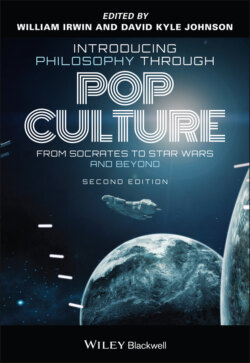Читать книгу Introducing Philosophy Through Pop Culture - Группа авторов - Страница 62
“The Illusions of Division Threaten Our Very Existence”
ОглавлениеFictional works such as Black Panther offer viewers a unique type of what Gaile Pohlhaus calls an epistemic resource: a resource that individuals draw upon in order to know.2 Pohlhaus tells us that epistemic resources are collectively held and maintained by an epistemic community; a community of knowers (which given the internet, can be very large).3 Above all, our epistemic resources need to “answer to our experiences.”4 Pohlhaus lists three potential kinds of epistemic resources: (i) language to express experience; (ii) concepts used to understand; and (iii) criteria to judge the usefulness of a resource.5 Pohlhaus acknowledges, though, that there may be other kinds of resources beyond these three.6 For our purposes, we need to answer two questions about fictions and epistemic resources: (i) Do the resources we gain from fictions like Black Panther answer to experience? (ii) What kind of epistemic resource are they, if they are not language, concepts, and criteria?
When we consume a fictional work, it is possible to learn from and use elements of the work to better interpret the world. Not every aspect of a fictional work is going to be answerable to or directly reflect our experiences in the real world. I have not personally met a Klingon warrior, for example, attended Hogwarts School of Witchcraft and Wizardry, or wielded one of Okoye's spears. Fiction is enjoyable because it can reach beyond what is possible of the real world, and is not confined by it, like everything Shuri creates in her lab. But fiction also contains elements that are salient to us in the real world, that correlate to what we experience or what we know, like Killmonger's Oakland upbringing and his understanding of slavery and oppression. As such, we can understand Black Panther as providing viewers with epistemic resources, because it gave (and continues to give) many people new conceptual tools to understand and communicate about Black and particularly African American culture and experience, whether the viewer is Black or is not. Thus, the film serves as an important addition to the epistemic resources that we all share and collectively maintain.
Even if it's just the moral of the story – such as the racial politics of X‐men, or the allegory of American liberalism in Star Trek: The Original Series – fictional works like Black Panther can add to our understanding of real‐world phenomena even if they don't directly represent them. In this sense, fictions do seem to answer to our experiences. We draw upon them in order to better understand and interpret the world, and therefore gain epistemic resources. The question of what kind of resources fictions offer – if not language, concepts, and criteria – however, requires a longer response.
